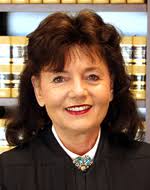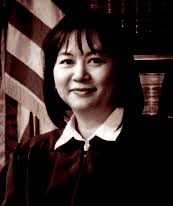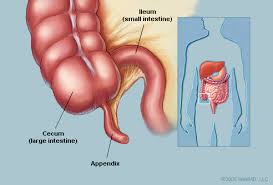Thursday, April 4, 2013
"A Bad Outcome for Mr. Good"
Last month we posted about judicial rescuse missions and Mr. Good's "stubborn refusal" to follow the appellate rules (here). A more detailed discussion of Good v. Miller appears in yesterday's Daily Journal article "A Bad Outcome for Mr. Good," by Reed Smith's Appellate Practice Group Chair Paul Fogel (Hon. ret.) and associate Ilana Herscovitz. They characterize Good's result as "harsh yet refreshing." Makes it sound like a stiff drink...

More on Moore!
Today's DJ profiles 4/3's Justice Eileen Moore. Here are a few "take aways":


- caring demeanor; very compassionate person; a humanitarian
- enjoys the scholarly side of the law and writing
- combat nurse in the Vietnam War; mentors veterans
- profits from a macrame business, Knots & Pots, funded law school at Pepperdine
- tort plaintiffs lawyer in practice; cross-examined Pat Boone and Wally George
- a Republican who marched with Cesar Chavez
- "Race Results" is her book about minorities' progress at the High Court and in film; upcoming book "Gender Results" addresses the treatment of women by the Supreme Court and in movies
- arranged the high school art contest for the paintings that decorate 4/3
Tuesday, April 2, 2013
2d District pro tem update
Can you look at the map on your phone while driving?
In the old days, it wasn't uncommon to drive with a map on your lap or on the dashboard or in the passenger seat. Today, cell phones have great map apps useful for navigation. But it's illegal to be looking at your cell phone while driving... Thus, you can't use your map app while driving, according to the Fresno County Appellate Division in today's opinion (in gloriously retro courier font):


Public concern about the dangers of distracted driving has led to legislation that limits the use of cellular phones and electronic communications devices while driving. The drive behind this legislation was the concern about the interference with the driver‟s attention caused by the physical aspects of using these devices. This case requires us to determine whether using a wireless phone solely for its map application function while driving violates Vehicle Code section 23123. We hold that it does.
****
Because it is undisputed that appellant used his wireless telephone while holding it in his hand as he drove his vehicle, his conduct violated Vehicle Code section 23123, subdivision (a).
Monday, April 1, 2013
April's SoCal 9th Circuit Calendar: Who's here?
This month's 9th Circuit Pasadena argument calendar features:
- SoCal 9th Cir. Judges: Reinhardt, Fernandez, and M. Smith (with Robert Timlin (Sr. Distict Judge C.D. Cal. by designation);
- Non-SoCal 9th Circuit Judges are: Murguia, Rawlinson, Bybee, Berzon, and Tallman;
- And visiting judges by designation: Donald Molloy (Chief Judge of D. Montana), Robert Lasnik (W.D. Wash.), Lee Rosenthal (S.D. Tex.), Jack Zouharry (N.D. Ohio), and Michael Simon (D. Oregon).
Courts not answering the phones today?
That's because today is a State Court holiday:

PJ Gilbert's monthly DJ column discusses today's holiday thusly:
PJ Gilbert's monthly DJ column discusses today's holiday thusly:
Today is a court holiday in celebration of the birth of Cesar Chavez, the great champion of farm worker rights. Today is also April Fools' Day, but this unfortunate coincidence of the sublime and the ridiculous occurring on the same day is of no significance. I would have preferred we celebrate Chavez's birth on his actual birthday, Sunday, March 31. But then we would not have a court holiday this year. I leave it to others to decide whether or not the trade-off is worth it. But I endorse the principle that birthdays need not be celebrated on the same date as one's actual birthday. No disagreement from those whose birthdays occur on Christmas, New Year's or Super Bowl day.(FYI, the next court holiday -- state & federal -- will be Memorial Day, Monday, May 27.)
Friday, March 29, 2013
SLAPPing Mr. Monkey?
Is Ahmed Khan really "Mr. Monkey"?
Perhaps if you live in Tyne and Wear (a small county in NE England), you would care.
Instead, what you really want to know is whether a non-party (like Mr. Khan) can file an anti-SLAPP motion and not get tagged for doing something frivolous. Turns out, naturally enough, the answer is no:
(Appellate specialist John Derrick, who's also a UK specialist, points out that Tyne and Wear "isn't that small a county. It ranks 13 out of 90" of counties in England in terms of population. Good point! It just looks small on the map...)
Perhaps if you live in Tyne and Wear (a small county in NE England), you would care.
Instead, what you really want to know is whether a non-party (like Mr. Khan) can file an anti-SLAPP motion and not get tagged for doing something frivolous. Turns out, naturally enough, the answer is no:
A nonparty to the action who disclaims responsibility for the publications alleged in the complaint and is not even alleged to be responsible in the complaint lacks standing to bring a motion under section 425.16.
| Ahmed Khan |
| More like, Goodbye, Mr. Monkey... |
March is Women's History Month
This blog recently reported on judicial demographics in California. Not to be outdone on the diversity front, the Feds have issued this report: Decades After O'Connor, Role of Women Judges Still Growing.

Florence E. Allen, the first woman to serve on a state Supreme Court and the nation’s first female Article III Judge. She was later appointed as Chief Judge of the Sixth Circuit in 1959 and was publicly supported as a possible candidate for the U.S. Supreme Court.
In 1981, there were 43 full-time women appellate and district court judges, 7.3 percent of the total. According to the Federal Judicial Center, whose web site provides biographical and demographic data on all federal judges, women now make up 235 of the 772 full-time judges in the U.S. District Court and Courts of Appeal—30.4% of the total.
Florence E. Allen, the first woman to serve on a state Supreme Court and the nation’s first female Article III Judge. She was later appointed as Chief Judge of the Sixth Circuit in 1959 and was publicly supported as a possible candidate for the U.S. Supreme Court.
Thursday, March 28, 2013
An appellate decision that could potentially impact every marriage?
No, not Hollingsworth v. Perry.
Instead, take a look at today's decision here, which begins its "Background" section like this:
Generally, it's a good thing if a court decision quotes a lot from your brief. The exception, of course, is if the purpose of the quotation is to shoot down what's been quoted. That's what happens, as the court concludes its Background section like this:
Instead, take a look at today's decision here, which begins its "Background" section like this:
The decision then goes on to quote the first six paragraphs from the AOB.Judging by appellants’ dramatic opening brief one might mistake this case for one of surpassing importance on the limits of state power to intrude into the affairs of its citizens, and specifically its married citizens. The brief opens this way: ....
Generally, it's a good thing if a court decision quotes a lot from your brief. The exception, of course, is if the purpose of the quotation is to shoot down what's been quoted. That's what happens, as the court concludes its Background section like this:
We think the case is much less sweeping in its implications, and we fail to see a holding adverse to appellants as a threat to the institution of marriage, as appellants would have it.Lesson? Well, a dramatic thematic policy opener might be appropriate in some cases. But make sure your case is worthy. Otherwise, you're just another Chicken Little.
| The sky is falling! |
Does "May it please the Court" please the court?
Check out Bryan Garner's What Judges Really Think About the Phrase "May it please the Court" for a history of this phrase, how to properly use it, and how a variety of appellate judges feel about this oral argument opener.
(Checking my last transcript of argument before Judge Graber, I see that I began with a double-opener: "Good morning, Your Honors. May it please the Court..." Phew.)
- Chief Judge Kozinski is quoting as saying "it's totally pointeless, but largely harmless, so it's a good way to get started."
- Judge Graber says "Its absence is always more notable than its presence, so I prefer lawyers saying May it please the Court."
| Please Judge Graber with a "May it please the Court." |
Kanner on Mosk: "Stanley Mosk, Cool Guy"
Today's DJ features Gideon Kanner's book review of "Justice Stanley Mosk: A life at the Center of California Politics and Justice," by Jacqueline R. Braitman and Gerald F. Uelman. Gideon had a dozen cases before Justice Mosk, and his review focuses on Justice Mosk's eminent domain jurisprudence.
| "Why wasn't any of Justice Mosk's towering dominance of California eminent domain law so much as mentioned in the Braitman-Uelmen Mosk biography? Wasn't it "politically correct" to do so?" |
Home, Sweet Home: 3d District Returns to Mosk
While not exactly SoCal Appellate News, it's still big news that the 3d is finally returning to the Stanley Mosk Library & Courts Building in Sacramento on April 8, after having left the building for renovations in 2009.

| versus |
Wednesday, March 27, 2013
"short, strange, and totally inadequate"
That may describe someone you know. But it's also the description used in a decision today to describe an opening brief that was about four pages long, cited only one case (and miscited it), cited no other legal authority, failed to cite the record, offered a cursory argument that "totally fails," and ... you get the idea.
The Court of Appeal (1/2) orders its clerk to forward the opinion to the State Bar for investigation and possible discipline for the totally inadequate briefing. Another object lesson in why lawyers must take their obligation to represent an appellant seriously and do a decent job, or else...
Also, 4/1 today awards $14,500 in appellate sanctions here against an appellant for bringing a frivolous appeal and making continued misrepresentations to the court. (Note that the respondent failed to properly request appellate sanctions by a separate motion, but the court steps in to award them sua sponte anyway.)
The Court of Appeal (1/2) orders its clerk to forward the opinion to the State Bar for investigation and possible discipline for the totally inadequate briefing. Another object lesson in why lawyers must take their obligation to represent an appellant seriously and do a decent job, or else...
| Warning! Falling anvil! |
9th Circuit Appellate Mentoring Program
The Ninth Circuit is starting an Appellate Mentoring Program.

"The Appellate Mentoring Program is intended to provide mentoring on a voluntary basis to attorneys who are new to federal appellate practice or would benefit from guidance at the appellate level. In addition to general assistance regarding federal appellate practice, the project will provide special focus on two substantive areas of practice – immigration law and habeas corpus petitions. Mentors will be volunteers who have experience in immigration, habeas corpus, and/or appellate practice in general. The project is limited to counseled cases."More details here.
Tuesday, March 26, 2013
DJ Profiles 9th Circuit Judge Nguyen
Can you name the three active 9th Circuit judges born abroad?
If not, today's DJ profile of Judge Nguyen has the answer.

If not, today's DJ profile of Judge Nguyen has the answer.
To read her story in her own words, click here.
Also, don't forget that Judge Nguyen will be a panelist on April 18 at the FBA-LA program "Thinking Like a New Federal Judge."
Monday, March 25, 2013
Ooops! Your appendix cite is showing...
How does 4/1 cite to an appellant's appendix internally? A decision today pulls back the curtain:
In May 2009 Neefe-Nolan filed a complaint for breach of contract against Schindelar-Szynter alleging they refused to cooperate regarding the exchange of easement deeds. !(1 AA 121-128)! Schindelar-Szynter answered and filed a cross-complaint alleging Neefe-Nolan failed to comply with the settlement agreement.

In May 2009 Neefe-Nolan filed a complaint for breach of contract against Schindelar-Szynter alleging they refused to cooperate regarding the exchange of easement deeds. !(1 AA 121-128)! Schindelar-Szynter answered and filed a cross-complaint alleging Neefe-Nolan failed to comply with the settlement agreement.
Friday, March 22, 2013
Justice Beds & Pink Bollworms
Don't miss Justice Bedsworth's column in today's Recorder -- which actually addresses appellate practice (more or less) -- titled "Appellate Bench's Tougher Moments." And you'll learn about pink bollworms. (See People v. Anderson (1987) 191 Cal.App.3d 207.)

"We! Are! Fam-ily!"
Family Gelechiidae, that is.
Family Gelechiidae, that is.
Thursday, March 21, 2013
Handling Large Record Appeals
Last night's LACBA ACS program on Handling Large Record Appeals had a great panel and large crowd of interested appellate practitioners.



(No photo of Dennis Fischer available)
Naturally there was much discussion about "doghouses" -- a doghouse being a file folder that holds about four volumes of materials (so roughly 6" or 1200 pages).
In most divisions, an appeal with 4 or more doghouses is called a "jumbo" (in some divisions 3 doghouses qualifies as a "mini-jumbo").
By the way, the sample "doghouse from a jumbo" that was used at the program was "7 of 9" a phrase that was used repeatedly without anyone mentioning Annika Hansen (Jeri Ryan)...


(No photo of Dennis Fischer available)
Naturally there was much discussion about "doghouses" -- a doghouse being a file folder that holds about four volumes of materials (so roughly 6" or 1200 pages).
In most divisions, an appeal with 4 or more doghouses is called a "jumbo" (in some divisions 3 doghouses qualifies as a "mini-jumbo").
By the way, the sample "doghouse from a jumbo" that was used at the program was "7 of 9" a phrase that was used repeatedly without anyone mentioning Annika Hansen (Jeri Ryan)...
"Can't that Jumbo be assigned to a red-shirted Research Attorney?"
And in today's DJ, the 2d District's APJ Roger Boren noted that although overall appellate filings are down since the 1990s, the court has been getting more jumbo cases than in the past.
Wednesday, March 20, 2013
New boilerplate for all civil litigation?
In an interesting decision today (Sinai v. Saltz) from 2/7, this paragraph jumped out at me as something that could apply in many, many cases...
"In reversing the trial court’s order, we do not intend to signal our approval of the manner in which this litigation has been conducted. It has gone on far too long. It has consumed far too much of the judicial system’s limited resources. Gamesmanship appears too often to take precedence over reasonable efforts to resolve procedural disputes and to address the merits of the remaining controversy. Civility and courtesy are absent. Strong oversight by the trial court is obviously necessary."

Monday, March 18, 2013
Old law discarded today re tort of diclosing private facts
For a nice example of how old rules are discarded and new law is made, look no further than today's opinion Ignat v. Yum! Brands. Here are three key paragaphs:
To sum up, the "rule" requiring a written publication as an element of a public disclosure of private facts privacy claim in California originated in dictum – which lacked support in the case law on which it was based – in an opinion that rejected the tort and all its principles, instead basing its holding on another principle entirely. It was followed by two cases from the 1960's, both of which cited Melvin's "principle" as if it had been a holding instead of a detour. (Gautier v. General Telephone Co., supra, 234 Cal.App.2d at p. 303; Grimes v. Carter, supra, 241 Cal.App.2d at pp. 698-699.) With these two exceptions, restricting privacy violations to written publications has been either roundly criticized or ignored by the courts dealing with disclosure of private facts in oral statements since the principle was first enunciated, in dictum, in Melvin. This is not a firm foundation for a ruling dismissing a cause of action.
We conclude that limiting liability for public disclosure of private facts to those recorded in a writing is contrary to the tort's purpose, which has been since its inception to allow a person to control the kind of information about himself made available to the public – in essence, to define his public persona. (See Briscoe, supra, 4 Cal.3d at p. 534; The Right to Privacy, supra, 4 Harv. L.Rev. at pp. 198-199.) While this restriction may have made sense in the 1890's – when no one dreamed of talk radio or confessional television – it certainly makes no sense now. Private facts can be just as widely disclosed – if not more so – through oral media as through written ones. To allow a plaintiff redress for one kind of disclosure but not the other, when both can be equally damaging to privacy, is a rule better suited to an era when the town crier was the principal purveyor of news. It is long past time to discard this outmoded rule.
The requirement that a public disclosure be in writing was the only basis for the trial court's ruling on respondents' motion for summary judgment. Accordingly we do not address any other issues raised in the motion or any other potential problems with the cause of action. Our ruling is limited to the necessity for private facts to be disclosed in a writing. We hold that disclosure in a writing is not required to maintain a cause of action for public disclosure of private facts.

What's more delicious than new law?
To sum up, the "rule" requiring a written publication as an element of a public disclosure of private facts privacy claim in California originated in dictum – which lacked support in the case law on which it was based – in an opinion that rejected the tort and all its principles, instead basing its holding on another principle entirely. It was followed by two cases from the 1960's, both of which cited Melvin's "principle" as if it had been a holding instead of a detour. (Gautier v. General Telephone Co., supra, 234 Cal.App.2d at p. 303; Grimes v. Carter, supra, 241 Cal.App.2d at pp. 698-699.) With these two exceptions, restricting privacy violations to written publications has been either roundly criticized or ignored by the courts dealing with disclosure of private facts in oral statements since the principle was first enunciated, in dictum, in Melvin. This is not a firm foundation for a ruling dismissing a cause of action.
We conclude that limiting liability for public disclosure of private facts to those recorded in a writing is contrary to the tort's purpose, which has been since its inception to allow a person to control the kind of information about himself made available to the public – in essence, to define his public persona. (See Briscoe, supra, 4 Cal.3d at p. 534; The Right to Privacy, supra, 4 Harv. L.Rev. at pp. 198-199.) While this restriction may have made sense in the 1890's – when no one dreamed of talk radio or confessional television – it certainly makes no sense now. Private facts can be just as widely disclosed – if not more so – through oral media as through written ones. To allow a plaintiff redress for one kind of disclosure but not the other, when both can be equally damaging to privacy, is a rule better suited to an era when the town crier was the principal purveyor of news. It is long past time to discard this outmoded rule.
The requirement that a public disclosure be in writing was the only basis for the trial court's ruling on respondents' motion for summary judgment. Accordingly we do not address any other issues raised in the motion or any other potential problems with the cause of action. Our ruling is limited to the necessity for private facts to be disclosed in a writing. We hold that disclosure in a writing is not required to maintain a cause of action for public disclosure of private facts.
What's more delicious than new law?
Subscribe to:
Posts (Atom)


